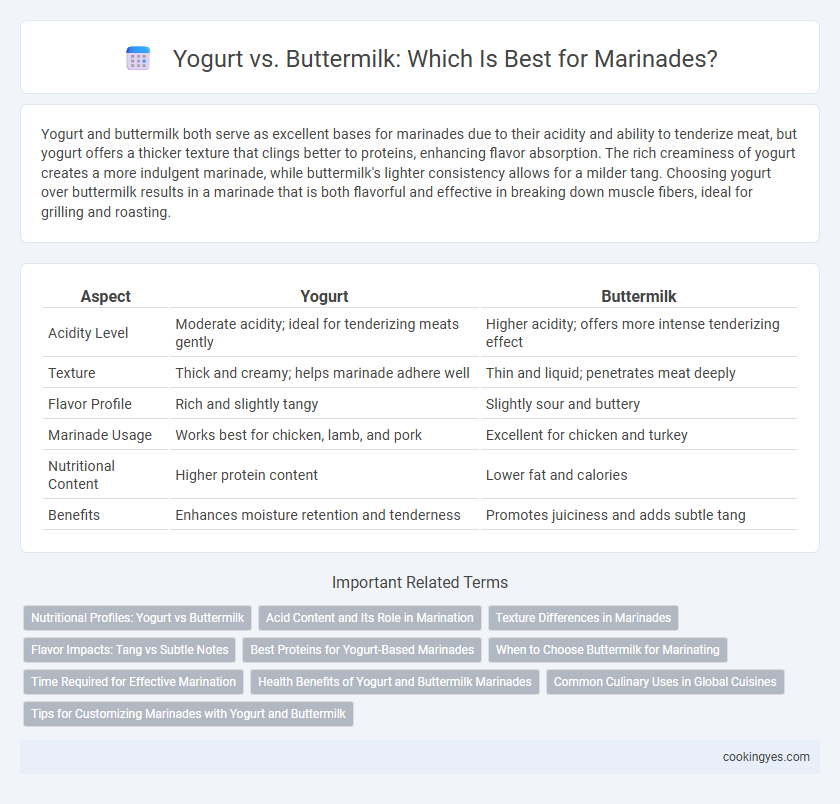Yogurt and buttermilk both serve as excellent bases for marinades due to their acidity and ability to tenderize meat, but yogurt offers a thicker texture that clings better to proteins, enhancing flavor absorption. The rich creaminess of yogurt creates a more indulgent marinade, while buttermilk's lighter consistency allows for a milder tang. Choosing yogurt over buttermilk results in a marinade that is both flavorful and effective in breaking down muscle fibers, ideal for grilling and roasting.
Table of Comparison
| Aspect | Yogurt | Buttermilk |
|---|---|---|
| Acidity Level | Moderate acidity; ideal for tenderizing meats gently | Higher acidity; offers more intense tenderizing effect |
| Texture | Thick and creamy; helps marinade adhere well | Thin and liquid; penetrates meat deeply |
| Flavor Profile | Rich and slightly tangy | Slightly sour and buttery |
| Marinade Usage | Works best for chicken, lamb, and pork | Excellent for chicken and turkey |
| Nutritional Content | Higher protein content | Lower fat and calories |
| Benefits | Enhances moisture retention and tenderness | Promotes juiciness and adds subtle tang |
Nutritional Profiles: Yogurt vs Buttermilk
Yogurt contains higher protein content and beneficial probiotics compared to buttermilk, making it a nutrient-dense option for marinades that enhances meat tenderness and flavor. Buttermilk offers a lower fat profile with significant calcium and vitamin B12, ideal for lighter marinades with mild tanginess. Both provide lactic acid that breaks down proteins, but yogurt's thicker texture allows for better marinade adherence and prolonged enzymatic action on meat fibers.
Acid Content and Its Role in Marination
Yogurt contains a moderate acid content, primarily lactic acid, which tenderizes meat by breaking down proteins without over-softening, making it ideal for marinades requiring balanced texture and flavor infusion. Buttermilk has a higher acidity level due to its fermentation process, resulting in more aggressive protein breakdown that can lead to a softer, more tenderized meat surface. Choosing between yogurt and buttermilk for marinades depends on the desired meat texture and marination time, with yogurt offering a gentler acid impact and buttermilk providing stronger tenderizing effects.
Texture Differences in Marinades
Yogurt-based marinades provide a thicker, creamier texture that clings better to meats, ensuring an even coating and enhanced moisture retention during cooking. Buttermilk, with its thinner consistency, allows for deeper penetration into the protein fibers, tenderizing meat more effectively but resulting in a lighter surface coating. The choice between yogurt and buttermilk affects both texture and flavor absorption, influencing the juiciness and crispness of the final dish.
Flavor Impacts: Tang vs Subtle Notes
Yogurt imparts a rich, creamy tang with a slightly sweet undertone that enhances marinade complexity and tenderizes meat effectively. Buttermilk offers a milder, subtler tang that adds gentle acidity without overpowering delicate flavors in proteins. The choice between yogurt and buttermilk in marinades ultimately influences the intensity of flavor and texture in the finished dish.
Best Proteins for Yogurt-Based Marinades
Yogurt contains a higher concentration of casein and whey proteins that effectively tenderize meat by breaking down muscle fibers, making it ideal for marinades. These proteins also help retain moisture and enhance flavor absorption better than buttermilk, which has lower protein content and primarily relies on lactic acid for tenderizing. Using yogurt with its abundant bioactive peptides can improve texture and juiciness while providing a rich source of calcium and probiotics beneficial in marinades.
When to Choose Buttermilk for Marinating
Buttermilk is preferred for marinades when tenderizing tougher cuts of meat due to its higher acidity compared to yogurt, which effectively breaks down protein fibers and enhances moisture retention. Its thinner consistency allows for more even penetration into the meat, making it ideal for deep flavor infusion in chicken or pork before grilling or frying. Buttermilk's lactic acid and enzymes also help create a crispier crust when cooking, especially in Southern-style fried dishes.
Time Required for Effective Marination
Yogurt marinades typically require 30 minutes to 2 hours to tenderize and infuse flavor, thanks to their thicker texture and higher protein content which helps break down meat fibers efficiently. Buttermilk, with its thinner consistency and mild acidity, generally needs 4 to 24 hours to soften meat properly, making it ideal for longer marination periods. The choice between yogurt and buttermilk affects marination time significantly, influencing both texture and taste outcomes.
Health Benefits of Yogurt and Buttermilk Marinades
Yogurt and buttermilk marinades are rich in probiotics that enhance digestion and support gut health, with yogurt containing higher protein levels aiding muscle repair. Both contain lactic acid, which tenderizes meat and promotes nutrient absorption, but yogurt's thicker texture allows for better adherence to food surfaces. Additionally, the calcium and vitamins B12 and D in yogurt and buttermilk boost bone health and immune function, making them nutritious choices for flavorful marination.
Common Culinary Uses in Global Cuisines
Yogurt serves as a versatile marinade base in Mediterranean, Middle Eastern, and Indian cuisines due to its creamy texture and probiotic-rich composition, which tenderizes meats effectively while imparting a mild tang. Buttermilk, frequently used in Southern American and some European recipes, offers a thinner consistency and a sharp acidity that breaks down proteins for a distinctively tender and flavorful result, especially in fried chicken and baked goods. Both dairy products enhance texture and taste through natural enzymes and lactic acid, but yogurt's thicker consistency is preferred for robust sauces, whereas buttermilk excels in lighter, crispier coatings.
Tips for Customizing Marinades with Yogurt and Buttermilk
Yogurt and buttermilk both tenderize meat effectively in marinades due to their lactic acid content, with yogurt providing a thicker consistency for a more adhered coating. Customize marinades by incorporating garlic, lemon juice, and spices like cumin or paprika to complement yogurt's creamy texture, while buttermilk pairs well with herbs such as thyme and rosemary for a lighter, tangier profile. Adjust marinating time between 2 to 8 hours depending on protein type to prevent over-tenderizing and maintain optimal flavor absorption.
Yogurt vs buttermilk for marinades Infographic

 cookingyes.com
cookingyes.com